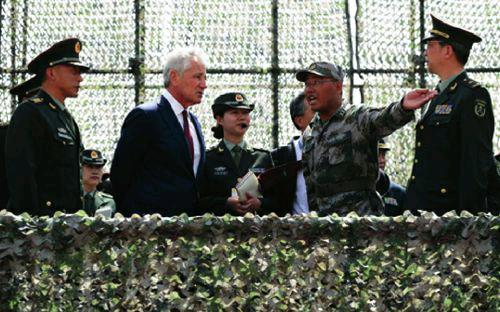Agreeing to Disagree
2014-05-09ByDingYing
By+Ding+Ying
The military relationship between China and the United States has been falling behind the process of building a newtype relationship between two major powers. U.S. Defense Secretary Chuck Hagels recent China visit proved that a great deal of efforts must still be made by both sides to strengthen mutual trust and respect in spite of differences.
Frankness
The tone of Hagels China tour from April 7 to 10 was unusual. Unlike the cliché “cordial and friendly atmosphere” between high-level exchanges, Fan Changlong, Vice Chairman of Chinas Central Military Commission, straightforwardly expressed dissatisfaction during talks with Hagel on April 8 for the latters remarks. Chinese observers are also concerned that Washingtons behavior might cause a new round of disputes in the region.
This was Hagels first visit to China since he took office last year. China was one of the stops of his 10-day Asia trip, which also took him to Japan and Mongolia. In an interview with Japans Nikkei newspaper on April 5, Hagel criticized Chinas air defense identification zone over the East China Sea as provocative and unilateral. Hagel hosted talks with Association of Southeast Asian Nations (ASEAN) defense ministers in Hawaii in early April, where he brought up topics of growing U.S. concern about territorial disputes in the South China Sea.
“Hagels attitude was astonishing,” said Zhang Qingmin, a professor of diplomacy with Peking University. “No other high-ranking U.S. officials publicly backed Japan like Hagel.”Zhang added that Washingtons tough attitude reflected its inflated sense of crisis.
Hagel has publicly supported Japans claim and welcomed the countrys review of the selfdefense aspect of its Constitution in spite of Washingtons assertions that it took no position on the Diaoyu Islands dispute. Just prior to his China visit, Hagel announced that the United States would forward-deploy two additional Aegis ballistic missile defense ships to Japan. Amid their territorial spat over the Diaoyu Islands, relations between China and Japan have been at an all-time low.
China didnt swallow the bitter pill in si-lence. “I can tell you frankly, your remarks made in the ASEAN defense ministers meeting and to Japanese politicians were tough, and with a clear attitude. The Chinese people, including myself, are dissatisfied with such remarks,” Fan told Hagel. Fan also blamed the U.S. side for apparently betraying its promises. “China hopes the United States can be a responsible great power and do more to promote regional stability and friendship between the two countries and militaries.”endprint
U.S. attitudes on the Asia-Pacific situation have caused worry among the Chinese. Zhang noted that although Washington claimed its goal was a stable Asia-Pacific, its biased stance on territorial disputes will encourage some nations to create trouble, which is going to lead to a result that even Washington doesnt want. Hagel expressed partial attitudes to the Philippines. Besides, the U.S. House of Representatives passed a bill calling for the sale of frigates to Taiwan on April 7.
Zhu Chenghu, a professor with Chinas National Defense University, pointed out that Hagels visit was supposed to cool down regional disputes. Hagels speech in Japan, however, had released a negative message. The professor warned that if the U.S. side insists on partial stances, regional tension could worsen.
Previously, Hagel was considered by Chinese observers to be a “mild” Republican who opposed war, due to his experience during the Viet Nam War in the 1950s to 1960s. But his acts after taking office have brought disappointment.
On June 1, 2013, Hagel declared that after his predecessor Leon Panettas decision to station 60 percent of the U.S. fleet in the AsiaPacific by 2020, the United States will dispatch 60 percent of its total air force in the region. Moreover, the Pentagon will deploy more troops and hi-tech weapons on land and at sea in the Asia-Pacific region, while sending 2,500 U.S. Marine Corps crew to Australia every year.
Zhu said that the China-U.S. relationship is a wind vane in the region, and regional disputes are connected to U.S. involvement. “If the U.S. side doesnt take its responsibility of maintaining regional peace and stability as it promised, then the regional situation will remain restless,”he stressed.
Mutual trust needed
In spite of differences, the China-U.S. military relationship is still on the right track of strength- ening cooperation. Chinese observers remain optimistic about the development of bilateral military relations. They believed that if the two sides accumulate mutual trust with patience through communication and cooperation, their military relationship might be a new highlight of China-U.S. relations.
Qu Xing, President of the China Institute of International Studies, pointed out that bilateral military relations are entering a new phase of maintaining regular dialogue, conducting reciprocal exchanges and deepening cooperation. He believed that if the two sides conduct practical discussion over sensitive regional issues, these relations can sustain stable and healthy development.endprint
During Hagels visit, the two sides reached consensus on building a new-type military relationship, which is a part of the China-U.S. “new-type major-country relationship,” a concept advocated by Chinese President Xi Jinping. When meeting with Hagel, Xi restated the principles of no conflict and no confrontation, mutual respect and win-win cooperation. He also called on the two sides to promote practical cooperation in various areas and manage effectively differences and sensitive issues so that the new type of major-country relations between China and the United States could move in the right direction.
Claiming his visit aimed to promote the new model of military relations that President Obama and President Xi have supported, the U.S. defense secretary said both sides have had positive, candid and constructive talks.
Hagel came up with three expectations on building a China-U.S. new-type military relationship, including keeping sustainable and substantial dialogues, conducting practical cooperation in fields the two sides have common interests and carrying out workable control through open communication over topics wherein they might have differences.
Hagel said the United States did not take any position on sovereignty disputes and hoped problems would be resolved peacefully through diplomatic means. The bill by a particular committee of Congress does not represent government policy, he explained.
To Zhu Feng, a professor of international studies with Peking University, the China-U.S. relationship shows the tendency of a strategic competition in East Asia. Hagel also admitted previously that Beijing and Washington are not enemies, but competitors.
Zhu Feng said that it is not necessary to cover up the competition between the two sides. At a time when regional hotspot and security issues require increasing coordination between the two sides, ChinaU.S. military exchanges should go beyond expanding bilateral defense cooperation, he said. In the foreseeable future, bilateral military relationship will decide whether or not the two sides can control conflicts when upgraded disputes occur.
Yao Yunzhu, a researcher with the Academy of Military Sciences of the Peoples Liberation Army, noticed that military and security relationship will be the indicator of mutual trust between China and the United States. “Building a new-type relationship between two powers and a new-type military relationship will input positive energy to the Asia-Pacific. By then, many current problems will be solved under the framework of such relationships,” she said. Yao added that the common interests between the two sides also require further communication and cooperation on regional issues to avoid unexpected conflicts because of misjudgment.
The military relationship has lagged far behind other relationships between China and the United States, especially the economic relationship, said Jin Canrong, Associate Dean of the School of International Studies with the Renmin University of China.“China made a good start of showing trust and transparency by inviting Hagel to visit its only aircraft carrier in spite of his inappropriate speech in Japan,” said Jin.
Hagel became the first foreigner to visit the Liaoning on April 7. It was a genuine gesture of China as carriers have always been treated with a symbolic standing in not only military but also a nations comprehensive strength.
Inviting Hagel to visit the carrier showed Chinas good faith of building a new-type military relationship with the United States, said Jin.“China is frank and faithful enough to show its sincerity. Now its Washingtons turn to make a gesture.”endprint
